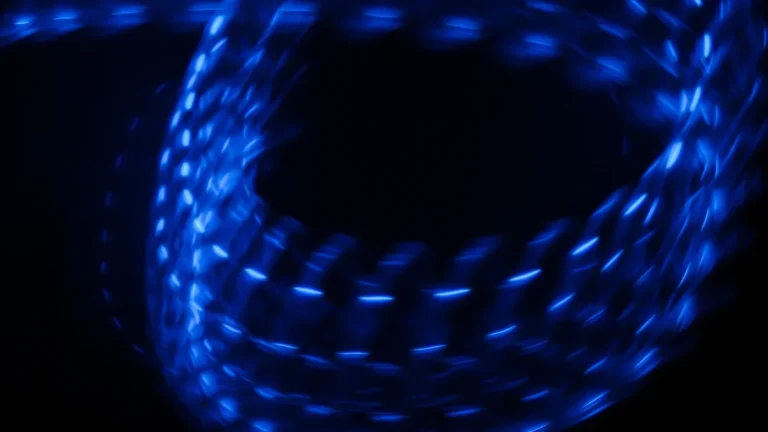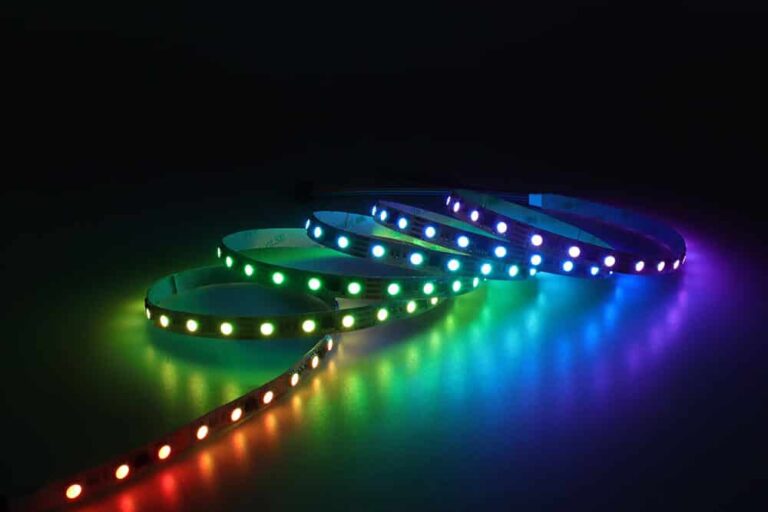How to Choose the Ideal LED Power Supply?
Table of Contents
Suppose you’re constructing your LED fixture, repairing or modifying pre-existing fixtures, or buying brand-new LED lights. In that case, it’s crucial to identify a suitable power source for your LEDs. This will either be a constant current LED driver, a constant voltage power supply, or potentially a blend of both to ensure the correct operation of your LEDs. The process of selecting a power supply for LED lighting involves considering a multitude of factors. This article aims to guide you through these considerations and assist in selecting the right power supply for your LEDs.

Why is an LED power supply necessary?
LED strips typically operate at a low voltage of 12Vdc or 24Vdc, and they can’t be directly plugged into the mains of 110Vac or 220Vac, as this could result in damage. To overcome this, an LED power supply or transformer is needed. It converts commercial power into the voltage the LED strip requires, either 12Vdc or 24Vdc.

Key Considerations for LED power supply selection
Choosing the right LED power supply for LED strips can be challenging. It would help if you had a basic understanding of LED power supplies and should consider multiple factors.
Constant current or constant voltage LED power supply?

What is a constant voltage LED power supply?
A constant voltage LED power supply is characterized by a stable voltage rating, commonly set at 5 V, 12 V, 24 V, or another specified value, alongside a range or maximum limit for Current.
All our LED strips are designed to operate with a constant voltage power supply.
What is a constant current LED power supply?
In contrast, constant current LED power supplies are assigned a fixed ampere (A) or milliampere (mA) value, coupled with a range or maximum limit for voltage.
Typically, constant current power supplies are not suitable for LED strips. This is because the current provided by these power supplies is fixed, and as such, any modification in the LED strip, such as cutting or connecting, will alter the Current.
Voltage
It’s crucial to verify that your LED power supply’s input and output voltage are accurate.

Input Voltage
The input voltage is dictated by the country where the power supply is utilized, as mains voltage differs from region to region.
For instance, China utilizes 220Vac(50HZ), while the United States operates on 120Vac(50HZ).
Please refer to the “Mains electricity by country” guide for more details.
However, some LED power supplies feature full voltage range input, indicating their universal applicability in any country worldwide.
Output Voltage
Ensure the power supply’s output voltage matches your LED strip’s voltage. Overpowering the LED strip could damage it and even potentially cause a fire.
Dimmability
Our LED strips allow for PWM dimming. If you wish to adjust the brightness levels, your power supply must have dimming capabilities. The power supply’s datasheet will indicate its dimming ability and the control types it supports. Common dimming methods include refer guide on Dim Your LED Strip Lights:
- 0/1-10V Dimming
- TRIAC Dimming
- DALI Dimming
- DMX512 Dimming
Environmental Conditions and Water Resistance
The usage area and environmental conditions significantly impact the power supply’s efficiency. Always check the power supply’s safe operating temperature range and ensure it’s used within it to avoid overheating. Avoid areas that are too hot or cold or lack proper ventilation.
Each power supply has an IP rating, representing its protection against solids and liquids. Make sure to choose a power supply with an appropriate IP rating according to the real situation.

Efficiency
The power supply’s efficiency is another crucial aspect. The efficiency percentage tells you how much input power is effectively used to power the LEDs. Generally, UL Class 1 drivers that power more LEDs tend to be more efficient.
Power Factor
Power factor indicates the efficiency of power usage. It’s calculated as the ratio of actual power used (Watts) to the apparent power drawn into the circuit (Voltage x Current). Power factor = Watts / (Volts x Amps), the closer the power factor is to 1, the more efficient the power supply.
Size
Consider the space where the power supply will be installed. It should fit in the space allocated, whether inside or outside the product. Power supplies come in various sizes to suit different needs.
Class I or II LED driver
Class I LED drivers, with basic insulation, rely on a protective ground connection for safety. On the other hand, Class II LED drivers provide additional safety measures like double or reinforced insulation and don’t rely on protective ground or installation conditions.

Safety Protection Features
For safety, LED power supplies should include protection features like over-current, over-temperature, short-circuit, and open-circuit. These features trigger a shutdown of the faulty power supply. Though these are not obligatory, they are recommended for safe operation.
UL Listed Certification
LED power supplies with UL certification promise superior safety and quality. Some projects might specifically require a UL-certified LED power supply.

How to link LED strip lights to the power supply?
Once you’ve selected the appropriate LED strip power supply, connect the red and black wires of the LED strip to their respective terminals or leads on the power supply. Be sure to match the positive and negative terminals of the strip to the positive and negative poles of the power supply output. The symbol + or +V corresponds to the red wire, while – or -V or COM represents the black wire.

Can multiple LED strips be connected to a single LED power supply?
Yes, you can connect multiple LED strips to a single power supply. However, ensure that the power supply’s wattage is adequate and that the LED strips are connected in parallel to minimize voltage drop.

What distance can an LED tape be from its LED power supply?
The voltage drop becomes more significant the farther the LED strip is from the power supply. Opt for thick, large-gauge copper cables to minimize voltage loss if you’re using long cables between the power supply and the LED strips. For more details, refer to the guide on “LED strip voltage drop.”
Installation tips for LED power supply
Like most electronic devices, LED drivers are sensitive to moisture and temperature. Install the LED driver in a dry, well-ventilated area to ensure reliability. Adequate mounting is essential for air circulation and heat transfer, which promote optimal performance and longevity.
Avoid overheating
Ensure the LED power supply is installed in a well-ventilated area. Good airflow aids heat dissipation and maintains the power supply’s operating temperature.
Limit the power supply’s “on” time.
Install a switch at the power supply’s main input end. When lighting isn’t needed, disconnect the switch to turn off the LED power supply fully.
Reserve some wattage in your LED power supply.
Avoid consuming the full capacity of the power supply. Using only 80% of the driver’s maximum power rating is recommended to prevent it from continuously running at full power and overheating prematurely.
Troubleshooting common LED power supply issues
- Ensure sufficient LED power wattage: If the power supply’s wattage is insufficient, it may be damaged. Some power supplies have overload protection and will automatically cycle on and off. This could cause the LED strip to flicker continuously.
- Ensure correct wiring: Thoroughly check the wiring before powering up. Incorrect wiring can cause permanent damage to both the LED power supply and the LED strip.
- Verify the voltage: Ensure the input and output voltages of the LED power supply are correct. Incorrect input voltage can damage the power supply, and incorrect output voltage can damage the LED strip.
Leading LED power supply brands
I have compiled a list of the top 5 renowned LED brands to assist in your search for a dependable LED power supply. For additional information, refer to the article “Top LED Driver Brand Manufacturer List.”
1. OSRAM

OSRAM Sylvania Inc. is the North American division of the prominent lighting manufacturer OSRAM. Their range of products spans industrial, entertainment, medical, smart building, city applications, and automotive aftermarket and original equipment markets.
2. TRIDONIC

Tridonic is a premier lighting technology supplier, delivering intelligent hardware and software with exceptional quality, reliability, and energy efficiency. As a pioneer in network technology based on lighting, Tridonic offers scalable, forward-looking solutions enabling new business opportunities for lighting manufacturers, building managers, systems integrators, planners, and numerous other clients.
3. PHILIPS

Formerly known as Philips Lighting, Signify’s roots trace back to Philips in Eindhoven, the Netherlands. With over 127 years of industry-leading innovations, we’ve served both professional and consumer markets. In 2016, we branched off from Philips to become an independent entity listed on the Euronext Stock Exchange in Amsterdam. By March 2018, we were included in the benchmark AEX index.
Conclusion
When determining the appropriate LED power supply for your LED strip, you must consider elements such as current, voltage, wattage, the size and shape of the power supply, IP ratings, dimmable, and connector type. After carefully considering all these aspects, you can make an informed decision and choose the ideal LED power supply for your project.
At MyLikeLed, we produce top-tier LED strips and LED neon flex. All our offerings undergo stringent testing in advanced laboratories to guarantee the highest quality. Additionally, we provide customization options for our LED strips and neon flex. So, for superior LED strip and LED neon flex solutions, reach out to MyLikeLed, at your earliest convenience!
FAQs
Choosing the right power supply ensures your LED lights work safely and efficiently. The wrong one can cause flickering, dim lights, overheating, or even damage your LEDs.
Add up the total wattage of all your LED strips or lights, then choose a power supply with at least 20–30% more wattage. For example, if your LEDs need 80 watts, go for a power supply with at least 100 watts.
Yes, always match the power supply voltage to your LED strip. If your strip is 12V, use a 12V power supply. Using the wrong voltage can damage the lights or make them not work at all.
Most LED strips use constant voltage power supplies, like 12V or 24V. Constant current power supplies are used for special LED setups like high-power LEDs. Always check what your LEDs require before buying.
Yes, as long as the power supply has enough wattage and the same voltage as the LED strips. You can connect multiple strips in parallel and power them with one supply safely.

Hi, I’m Xylia Xiong, a sales professional with 14 years of experience in the LED strip light industry. I specialize in providing tailored solutions, leveraging my expertise in LED products and the latest industry trends. Known for effective communication and problem-solving, I’m dedicated to helping lighting manufacturers, importers, and distributors achieve their goals.
Let’s work together to create customized solutions that exceed expectations.
Related Posts

The Best LED Strip Lights You Can Buy Right Now

Comparing WS2811 Vs WS2812B: Key Differences


